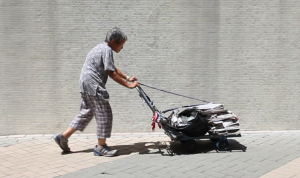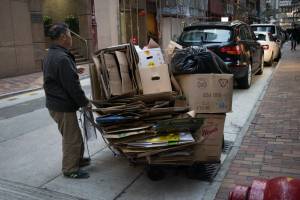I remember the first time I saw one of Seoul’s 50,000 pyeji jumneun saram (literal translation: “trash pickup men”). It was in the winter of 2009, and I had just moved here from Daegu. One night in the vicinity of Ewha Womans University, I saw an old man pulling a two-wheel cart, piled high with  cardboard, up a steep hill. The poor guy was struggling, and he had practically come to a halt. He was getting no sympathy from those around him. You think the students were going to lift a finger? I crossed the street and pushed as he pulled. Together, we got him to the top. Of course, what he did after that I cannot pretend to know.
cardboard, up a steep hill. The poor guy was struggling, and he had practically come to a halt. He was getting no sympathy from those around him. You think the students were going to lift a finger? I crossed the street and pushed as he pulled. Together, we got him to the top. Of course, what he did after that I cannot pretend to know.
My neighborhood, southeast of Gangnam Subway Station, has lots of these men—and it’s primarily a male occupation. I wince to see them picking up paper, cardboard, bottles, metal and just about anything that can be recycled. Up it goes on their carts, held in place by twine when necessary. They then move on, their eyes pealed for more “trash.” That is a loaded word. The stuff actually has economic value, and the work done by the pyeji jumneun saram is valuable as well. They play an important role in the Korean recycling program which, I have read, is the envy of many European countries.
Our local Jongnyangjae
I was on my bicycle in neighboring Seocho last weekend when I noticed a recycling center with many of the familiar carts lined up. Just two days later, I visited there with my friend Yong Yoon. We passed under a sign identifying it as Jongnyangjae, a place for “effective collection of garbage and re-use of natural resources.” It included a second-hand store. Soon we came to what seemed to be the center of the  operation. The boss-man—whose name we failed to get—was operating a crane, separating the various materials that had been brought in. He was demolishing a refrigerator so its components could be stripped.
operation. The boss-man—whose name we failed to get—was operating a crane, separating the various materials that had been brought in. He was demolishing a refrigerator so its components could be stripped.
Jongnyangjae has a set of ground-level scales which serve the purpose of weighing the stuff brought in by the freelance scavengers and calibrating how much they are to be paid. To somebody like me—an outsider in more ways than one—the place had a faint odor, a sense of disorganization and even a bit of danger. There were men sitting here and there, and several sets of shoes had been washed and were drying in the sun. I can think of no better example of Seoul’s jam-packed nature than the fact that this facility is scarcely a kilometer away from the headquarters of Samsung, the biggest and most prosperous company in Korea.
Mr. Kim
In came a man with a full-to-the-brim cart. After dropping off the contents and being paid 8,000 won, he was a bit surprised to have Mr. Yoon and me peppering him with questions. His family name was Kim, but he preferred to leave it at that. He seemed to be about 40, considerably younger than most pyeji jumneun saram. Mr. Kim informed us that he is single, that he used to have a home but somehow lost it, that he makes three trips per day and thus earns nearly 1 million won per month (300,000 is the average), that he has been doing this for six months and that he really wants out. Before he took his cart and got back to work, I gave him 10,000 won. With Mr. Yoon performing instant translation, I said to the entire group, “You guys are doing valuable and important work. I respect you.”
It irks me the way most people ignore them; my experience near Ewha in 2009 is indicative. Do they think these fellows enjoy being out on the streets, lugging refuse around in carts in all kinds of weather? Most, as I said earlier, are old. Many are homeless or live in virtual hovels. The suicide rate among elderly Koreans has tripled in the past 15 years and is the highest in the developed world. Half—half!—of Korea’s elderly are below the poverty line. This country, which has so many reasons to be proud, lacks an adequate safety net. A person who falls can fall far and fast. Not to paint with an overly broad brush, but these are the people who built the country during the 1960s and 1970s. They may have assumed that their children would take care of them in their later years. That’s how it used to be, right? Much has changed in Korean society. If you have only one kid and he/she does not adhere to the ancient concepts of filial piety, you are out of luck. Alternatively, one business failure and you may lose it all—ending up as a pyeji jumneun saram.

Add Comment